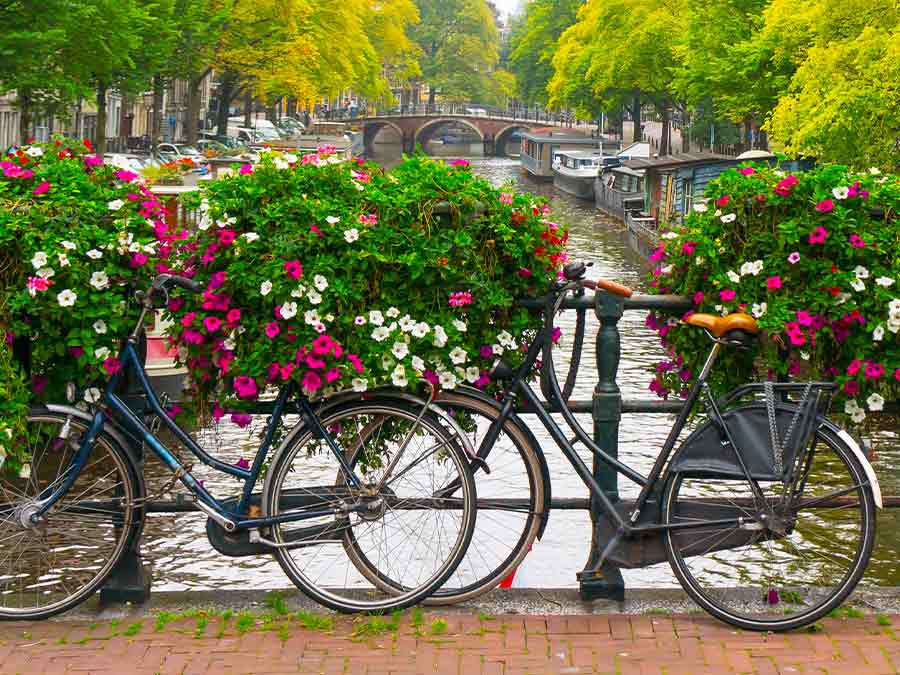
7 sustainable travel trends for 2020
Not all travellers pack the same way, visit the same cities, eat the same cuisine or see the same sights. But there’s one thing almost every traveller shares - an appreciation for the beauty of planet Earth.
From carbon emissions to waste, travelling can sometimes come at a hidden environmental cost, and result in us participating in unsustainable practices without even knowing it. So how can we do our bit in protecting the incredible destinations we visit?
The following seven strategies are simple ways to make a positive difference while travelling, and even present an opportunity for a richer, more fulfilling overseas adventure.
1. Take it slow
Skipping from city to city can be an exciting way to explore, especially in places like Europe. However, all of those miles on the land and in the air can come at an unfortunate environmental cost.
Slow travel, or the concept of spending longer periods of time in fewer destinations, can be a great way to reduce your environmental footprint. It’s also a great opportunity to forge deeper connections with the places you visit; exploring in more detail instead of rushing through the famous sights before moving on.
If you’re interested in practising slow travel but the idea of spending weeks at a time in one city doesn’t appeal to you, try breaking up your visit by staying in different neighbourhoods. For example, if you were travelling in London, you could spend the first few days seeing the top tourist destinations in the centre of the city, then spend another few days exploring London’s lesser-known attractions while staying in another area.
2. Consider alternative transport
Sometimes, racking up long travel miles can’t be avoided. Whether you’re exploring European cities or the African continent, frequent short flights provide the fastest way from A to B, but not the most environmentally friendly approach.
Like slow travel, trains, boats and buses can be better for the environment and allow you to experience your destination on a deeper level.
According to Eurail, trains emit up to 75 per cent less carbon than cars and planes and also use less energy, space and noise. Not to mention the chance to soak in the European countryside and enjoy the sights of places you may soar over if you were flying.
If you’re travelling through Europe and are interested in monitoring your carbon footprint, you can use the Eco Passenger website to calculate the energy consumption, C02 emissions and broader environmental impact of your travel.
3. Pack with care
Sustainability isn’t always top of mind while you’re packing your bags. However, making considered choices about what you pack can shape your behaviour overseas, and help you to make those sustainable travel concepts a reality.
Here are a few easy and eco-friendly items to consider for your next trip:
● Reusable water bottle
● Reef-friendly sunscreen
● Bamboo toothbrush
● Reusable food container
● Organic deodorant
Smarter choices while you’re travelling can also help to reduce your footprint. Items like zero-waste snacks (e.g. fruit), and reusable shopping bags all add up.
4. Go off the beaten track
New York City, Tokyo, Paris, London - these top-tier travel destinations are at the top of the bucket list for so many travellers. So many, in fact, that these cities often experience significant congestion leading to increased air pollution. Tourists aren’t necessarily the cause of this pollution, but they’re certainly a contributing factor.
That’s why going off the beaten track, exploring eco-friendly destinations and easing the strain on these cities can be a sustainable travel choice. Have your heart set on the above cities? Consider these alternatives:
● Try Boston instead of New York City
● Try Osaka instead of Tokyo
● Try Lyon instead of Paris
● Try Bristol instead of London
5. Support sustainable businesses
Making a big environmental difference can be as simple as being careful where you spend your tourist currency. Choosing hotels and tours with a demonstrated commitment to environmental sustainability ensures you’re rewarding the right kinds of businesses, and helping their influence to grow and inspire their competition to follow suit.
Want to make a sustainable choice but don’t know where to start? There are several industry standards and globally recognised certifications that apply to eco-friendly practices, which can be a great way to ensure you’re spending thoughtfully. For example, the TripAdvisor GreenLeaders Program showcases sustainable accommodation and tags these with an easy-to-identify ‘Green Leader’ badge when browsing their page. They’re also ranked according to the extent of their green practices.
6. Offset your emissions
There’s absolutely no doubt that flying is an essential element of travelling for most people, especially living in relatively remote island nations like New Zealand. However, there’s also no denying the considerable environmental impacts of aviation.
In fact, a study conducted by The Guardian found that a long-haul flight generates more carbon emissions than the average person produces in a whole year. Globally, this equates to about 2 per cent of all carbon dioxide emissions.
However, there are ways travellers can ‘repay’ this environmental cost; one of which is carbon offsetting. In a nutshell, air passengers can elect to pay an additional premium to ‘repay’ the cost of the emissions they contribute to through flying. That money is then used for various projects, like forestry and energy efficiency, which aim to reduce greenhouse gasses.
If you’re interested in offsetting your emissions, look for the option next time you book your flights online.
7. Practice conscious travel
“Leave every place better than you found it” - these should be words to live by for the eco-minded traveller. Embracing this philosophy not only means you’re doing your part for local communities, but also ensures you leave a positive legacy for future travellers.
Organised environmental events, like beach clean-ups, are common around the world and can be a great way to do your bit while meeting like-minded people. For example, One Island One Voice organise regular beach clean-ups in Bali and attracted over 13,000 people at their last event.
Do your research ahead of time if you’re interested in participating in a similar event while travelling - you’ll often find these gatherings listed in Facebook groups.
As you can see, there are so many simple yet effective ways travellers can play their part in preserving planet Earth. Doing your bit doesn’t need to break the bank, and can even present interesting travel opportunities and connect you with like-minded people.
Do you have a sustainable travel tip that isn’t on this list? We’d love to hear it! Please send us an email at stories@scti.co.nz and tell us more.
We won’t identify you unless you say we can, and we won’t use this information for any purpose other than marketing. If you want to access a copy of the personal information we hold about you, please contact us at info@scti.co.nz.
The content of this article is general and provided for information purposes only. Southern Cross Travel Insurance (SCTI) doesn’t guarantee or warrant the accuracy, completeness or currency of the articles.
This article may contain hyperlinks to other websites owned or operated by third parties, or references to third party products or services. SCTI isn’t responsible for, and makes no recommendation about the content or accuracy of any third party website, or for the suitability or performance of any product or service. The inclusion of a link in this article doesn’t imply that SCTI endorses the website or third party product/service.





